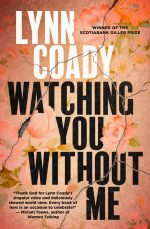
Watching You Without Me by Lynn Coady
Reviewed in Quill & Quire
September 2019
Publisher: House of Anansi Press
After four novels, two short-story collections (including the 2013 Scotiabank Giller Prize–winning Hellgoing), and appearances in myriad journals and anthologies, we’ve come to expect a certain level of excellence from Lynn Coady. Though less forceful and energetic than some of the author’s previous work, Watching You Without Me lives up to this expectation.
The novel opens with Karen, back home in Nova Scotia for the first time in more than a decade and dealing with the aftermath of her mother’s death from cancer. Aside from unpacking her guilt and grief, Karen also finds herself thrust into the role of caregiver for her older sister, Kelli, who was born with a developmental disability. The combination is understandably discombobulating: Karen slips back into caring for Kelli (as she did as a teenager) with surprising ease, yet the lack of her mother’s steadying presence constantly throws off her emotional balance.
Into this mix Coady introduces Trevor, a home-care worker hired to help with Kelli when her mother’s health began to deteriorate. Trevor is an overbearing narcissist who from the outset is pretty obviously not on the level, but Karen is blind (wilfully or otherwise) to his faults because he’s also convenient: being Kelli’s caregiver is an all-encompassing task, and having Trevor to rely on – even if it means consciously silencing the alarm bells ringing in her brain – is easier than trying to do it all alone. This is something Karen has consciously decided not to do. After watching her mother give up everything else in her life to take care of Kelli (the girls’ father died when they were young), Karen has always been determined that, as much as she loves her sister, she would not follow the same path. “Let’s face it, by the time I turned twenty I found that I’d done enough caregiving to last a lifetime. And let’s just say I made that known.”
The story that unfurls is largely predictable, but that’s not necessarily a criticism. In Karen’s first-person narration, Coady creates a very conversational tone, with Karen acknowledging throughout that she is, in fact, telling us a story. The result is that as each small twist in her situation is revealed, our reactions are much like those we’d experience chatting with a friend: the disbelieving gasp because what we’ve imagined in the lead-up to the revelation in fact came to pass, or the head shake and chuckle because we all know Karen should have seen that one coming.
Though the increasingly dangerous situation with Trevor frames the narrative, at its core, Watching You Without Me is about the relationships between Karen, Kelli, and their mother, Irene. But given that Irene is dead and Kelli is minimally verbal, most of the drama is related via Karen and Trevor, in the form of their bizarre family unit and through conversations regarding Karen’s recollections of her relationship with Irene.
These memories tend to serve two purposes. The first is to frame Karen’s selfishness in her younger years and the lingering defiance that informed her at the time. (Karen remembers their mother introducing Kelli to Karen’s religion class and telling them Kelli’s not just special, she’s extra-special. Karen’s recollection is marked by a high degree of petulance: “And if I hadn’t been eleven years old at the time I would have been thinking words along the lines of oh, for fuck’s sake.”)
But the second purpose is to show Karen’s maturity and growing understanding of Irene’s actions and motivations. When Karen herself suddenly comes to the realization that she doesn’t want to go back to Toronto and put Kelli into a residential facility (“one of those places”) as her mother had pre-arranged before her death, it evokes a buoyancy in her akin to the relief one feels when walking away from a dead-end job or a toxic relationship.
Because as much as this is a novel about family, it’s also a mid-life coming-of-age story about a woman who’s been ticking along in life, weathering its ups and downs (including a failed marriage complete with messy divorce), and generally accepting her mother’s responses of “I’m fine, it’s fine” as a convenient truth, to everyone’s detriment.
Coady is unsentimental in her assessment of this reality, and Karen is a sharp-tongued witness to her own evolution. Coady dedicates the novel to “the caregivers,” which should be a tip-off that readers are expected to afford Karen the benefit of the doubt and no small measure of sympathy. And we do, in large part because she’s funny and self-deprecating and a complete mess, dealing with a situation (albeit an extreme example of one) that anyone with a dependent or aging parent could easily find themselves in.
With Watching You Without Me, Coady showcases just how smooth her writing is. Though a couple of questions remain unanswered as the book draws to a close, the loose ends seem inconsequential when weighed against the much greater success of Coady’s expertly rendered characters, easy reading plot, and excellent pacing.

